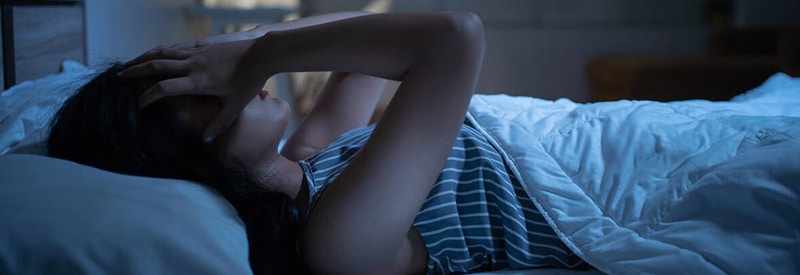
Sleep medicine in Carthage, TX
Sleep is essential to your physical and mental well-being. Adults need between seven and nine hours of sleep a night, yet millions suffer from sleep disorders that deprive them of necessary rest. At UT Health East Texas Sleep Disorders Center, our sleep specialists are dedicated to diagnosing and treating various sleep disorders. Our sleep disorder clinic clinic addresses a wide range of sleep-related issues, from common conditions like sleep apnea and nightmares to insomnia, narcolepsy, and restless leg syndrome. We understand the importance of a good night’s rest, which is why our sleep disorder treatments are tailored to each individual’s needs. From initial consultation to in-depth sleep studies, our goal is to identify and address the root causes of sleep disturbances, providing relief and improving your overall health and well-being.
Sleep disorders we treat
Sleep can be divided into two types: (REM) sleep and non-REM (NREM) sleep. NREM sleep has four stages of increasingly deep sleep. Stage 1 sleep is the lightest, while stage 4 is the deepest. During normal sleep, you cycle through these types and stages of sleep. But if your sleep is repeatedly interrupted and you cannot cycle normally through REM and NREM sleep, you may feel tired, fatigued, and have trouble concentrating and paying attention while awake. Sleepiness puts you at greater risk for driving and other accidents.
Our sleep disorder clinic provide treatments for the following conditions and sleep disorders:
- Circadian rhythm disorders: Circadian rhythm disorders include jet lag, adjustments to shift work, delayed sleep phase syndrome (you fall asleep and wake up too late) and advanced sleep phase syndrome (you fall asleep and wake up too early).
- Insomnia: People who have insomnia don’t feel as if they get enough sleep at night. They may have trouble falling asleep or may wake up frequently during the night or early in the morning. Insomnia is a problem if it affects your daytime activities. Insomnia has many possible causes, including stress, anxiety, depression, poor sleep habits, circadian rhythm disorders and taking certain medications.
- Narcolepsy: Narcolepsy is a brain disorder that causes excessive daytime sleepiness. There is sometimes a genetic component, but most patients have no family history of the problem.
- Night terrors: Night terrors are frightening dreams that arise during REM sleep. They can be caused by stress, anxiety and some drugs.
- Pregnancy sleep issues: Women often experience sleepless nights and daytime fatigue in the first and third trimesters of their pregnancy.
- Restless leg syndrome: In people who have restless legs syndrome, discomfort in the legs and feet peaks during the evening and night. This can delay sleep onset and cause brief awakening during sleep
- Sleep apnea: One of the most serious sleep disorders is sleep apnea where you literally stop breathing during sleep. This may happen hundreds of times a night, causing you to awaken slightly to resume breathing. Sleep apnea may lead to high blood pressure, cardiovascular disease, weight problems or other health problems.
Symptoms of sleep disorders include excessive snoring, waking up with a headache or not feeling refreshed, daytime sleepiness, sudden body movements during sleep, weight gain, and suddenly waking up gasping for breath. If you are experiencing any of these symptoms, it may be time to schedule a consultation with a sleep specialist.
Sleep apnea treatment
Sleep apnea is a serious sleep disorder where a person’s breathing repeatedly stops and starts during sleep. It often results in poor sleep quality and excessive daytime sleepiness, but more importantly, it can have long-term consequences for overall health. People with untreated sleep apnea are at increased risk for developing high blood pressure, heart disease, stroke, diabetes, and depression.
Due to these risks, it’s crucial for individuals who suspect they have sleep apnea to seek medical evaluation and treatment to manage the condition effectively and reduce the potential for more severe health complications.
Sleep apnea is treated with lifestyle changes, mouthpieces, breathing devices and surgery. The goal is to help you restore regular breathing during sleeping and relieve your snoring and/or daytime sleepiness. If you have mild sleep apnea, some changes in daily activities or habits might be all the treatment you need.
- Avoid alcohol and medicines that make you sleepy
- If you smoke, quit
- Keep your nasal passages open at night with nasal sprays or allergy medicines, if needed
- Lose weight if you’re overweight or obese
- Sleep on your side instead of your back to help keep your throat open
Our specialists offer other treatments to help combat your sleep apnea. Please call us to schedule an appointment.
About our sleep studies
At UT Health Carthage’s Sleep Medicine Clinic, our sleep study services are designed to provide comprehensive evaluations for diagnosing and understanding sleep/wake disturbances. Patients undergoing an overnight sleep study at our clinic will have key parameters like brain waves, heart rate, snoring, respiration, leg muscle activity, and oxygen saturation levels meticulously monitored.
Our noninvasive sleep study process uses recording techniques that painlessly apply electrodes to the skin. Patients will sleep overnight in a private suite with a comfortable bed to ensure a restful environment where your sleep patterns can be observed and recorded. For those experiencing significant daytime sleepiness due to sleep/wake disorders, we offer an additional daytime sleepiness evaluation. This involves staying at our center during the day for a series of four naps taken at two-hour intervals, with meals provided.
Upon completing the sleep study, your physician at UT Health Carthage will carefully review the results and discuss effective treatment options with you, aiming to significantly improve your sleep quality and help you achieve a more restful night.

